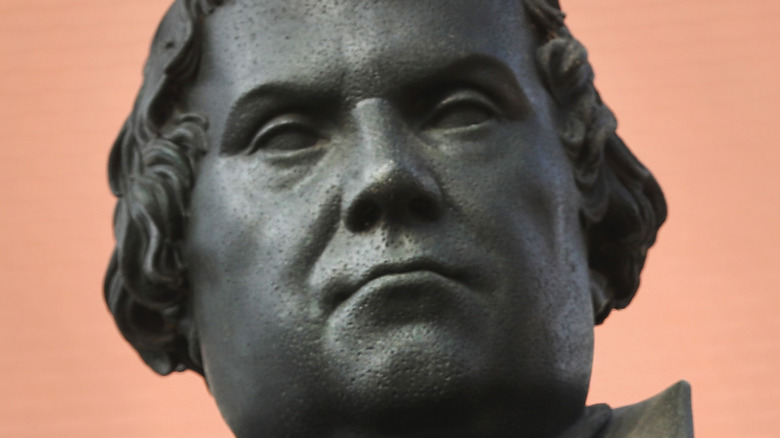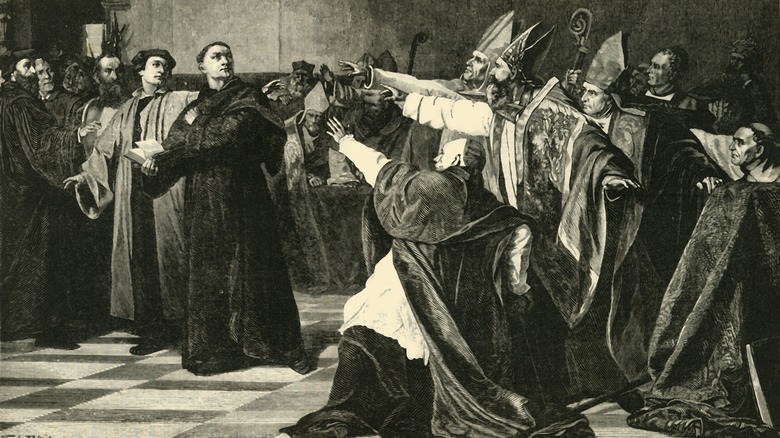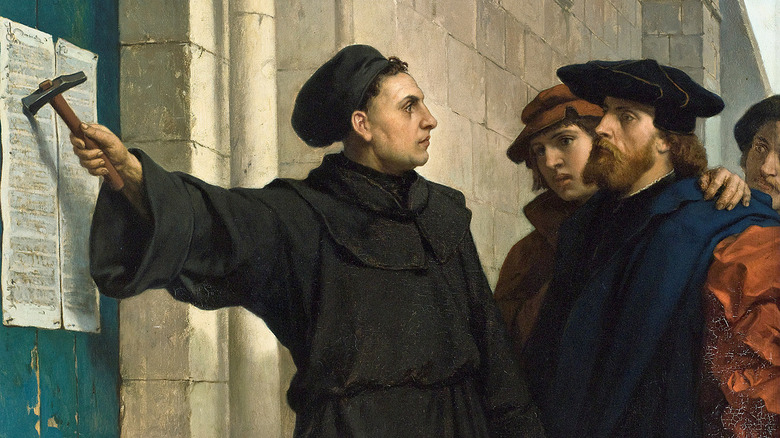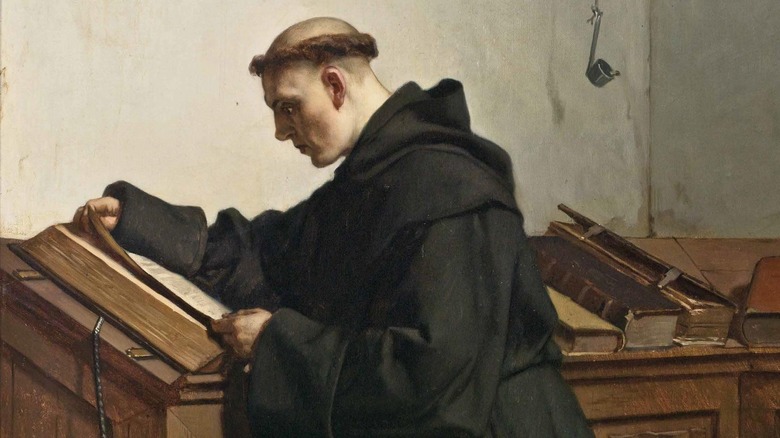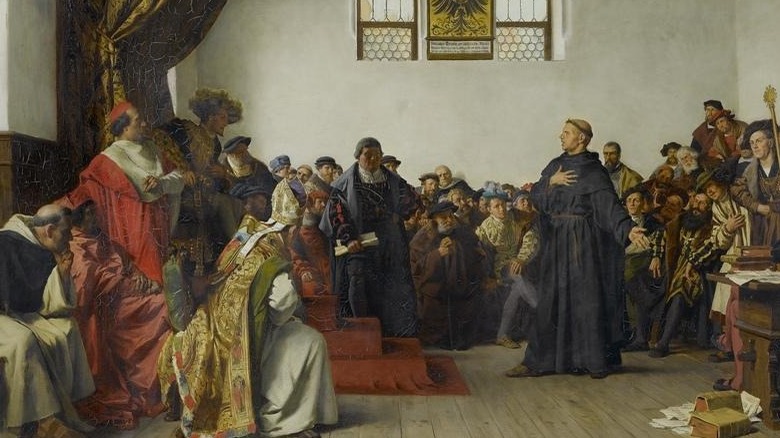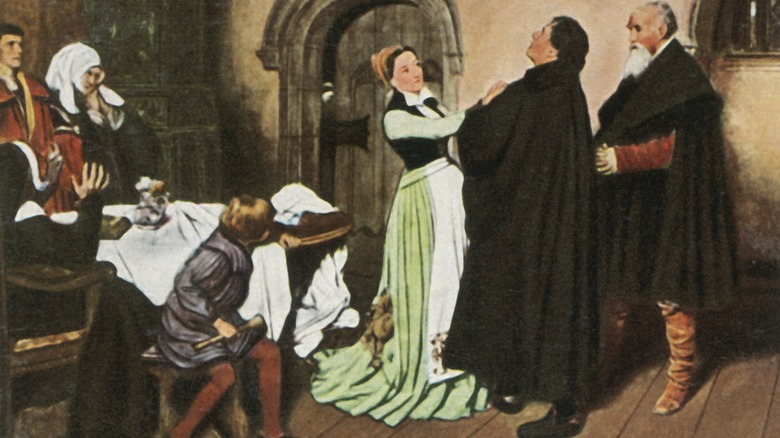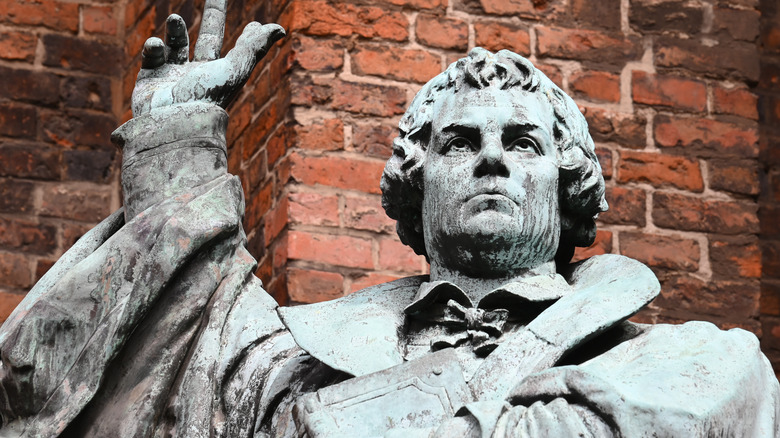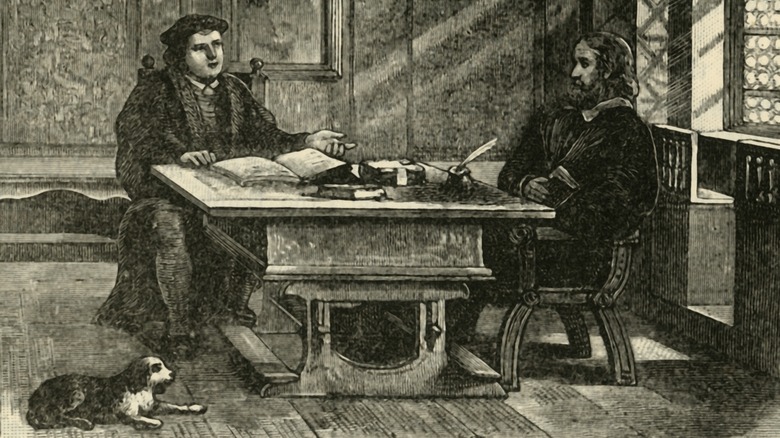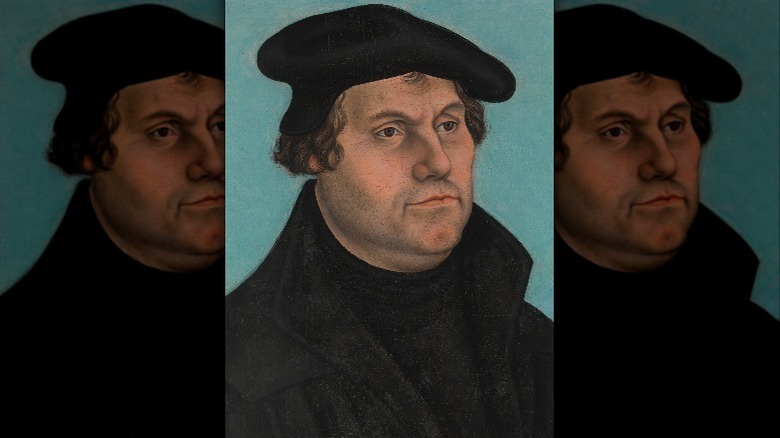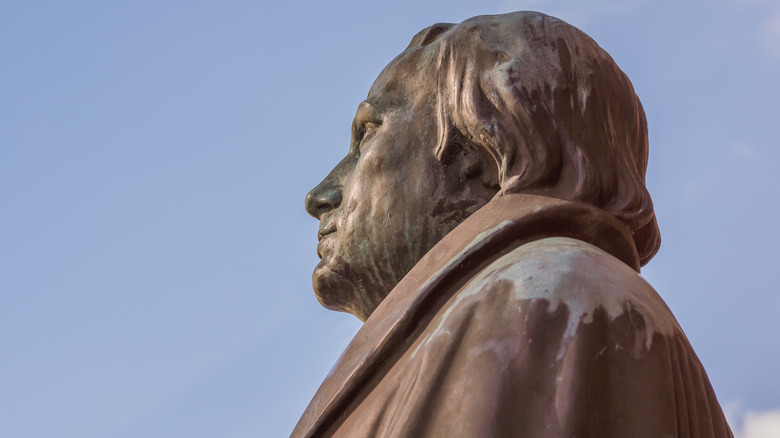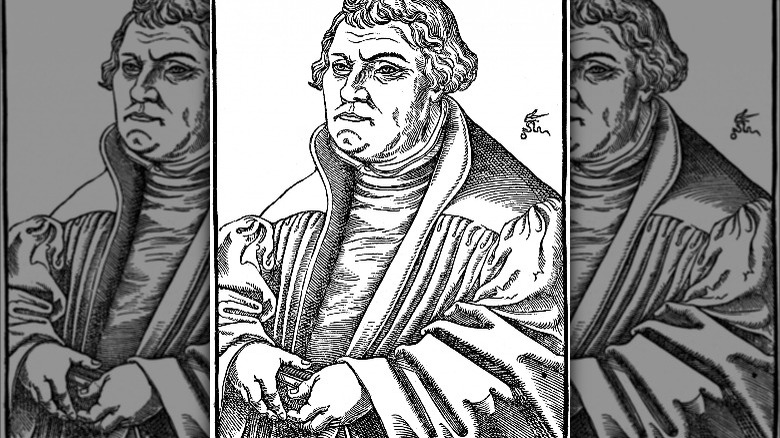The Untold Truth Of Martin Luther
Martin Luther is pretty widely known as the man who instigated the Protest Reformation of 1517, according to Britannica. That's his claim to fame, after all — his great lasting legacy. Here was a German monk who saw the Catholic Church abusing its power, taking advantage of a general population that couldn't read the Bible themselves, and he stepped up and decided to do something about it.
And let's just say he wasn't exactly wrong. The Catholic Church was guilty of some pretty awful things, such as charging the faithful money to lessen their time in purgatory, inventing purgatory in the first place, and not providing a Bible that could be read by all, which honestly seems like the first step in building a religion. All this according to Modern Reformation in an article that details even more of the items on the expansive list of Pre-Reformation woes.
Martin Luther saw these injustices, and he raised them another 90 or so, writing his way into the annals as a controversial figure who, for all the good he did, also had a darker side, as well as some quirks not generally associated with religious folks.
He was a master of dissing
There is an art to really insulting someone; to make words actually hurt to the point that it alters their mood or, if you dug deep enough, their mental state. Given millennia of evolving languages, those insults have had to get more elaborate over the years. Calling someone "idiot" just doesn't cut it anymore. Martin Luther, however, does cut it, and he cuts it about as hard as a katana fresh off the whetstone of a century-old sword-master.
Luther's snapping tongue has such a reputation that there's even the online Luther Insulter, which randomly generates an insult said by Luther himself, should you feel the need to be insulted. Some of his highlights include, "Are you ignorant of what it means to be ignorant?" "We despise your whorish impudence," and "You're a gross, ungrateful clod, worthy of being numbered among the beasts."
One might not think of a religious man as someone keen on tongue lashings, but clearly, Martin Luther defied the Catholic Church in more ways than one. (Slate also highlights just how delicious the insult generator is, showing off some of the best of the reformer themselves.)
He probably didn't nail the 95 Theses to anything
If Martin Luther's claim to fame is the start of the Protestant Reformation, his initial contribution was the 95 Theses. This was a list of 95 statements Luther planned to defend against the Catholic Church in order to barrel through the facade of power and extortion they'd built for themselves. It was in these theses that he argued against such things as indulgences (paying money for forgiveness). A copy made its way to Rome and sparked the conflict that would rupture the church.
But it wasn't just the writing of the theses that earned Luther attention. As legend has it, he nailed this lengthy list to the front door at the castle church in Wittenberg. According to the Time, however, there was nothing noteworthy about the posting of the theses. Professor Andrew Pettegree points out (via Time) that the door would have been the community bulletin board, and thus not very dramatic at all.
Historian Peter Marshall casts doubt on the whole nailing event at all (via Time), saying that it wasn't even mentioned until 30 years after the fact, and never by Luther. For someone who wrote as much as Luther, that seems an improbable oversight.
He made a near-death deal with St. Anna to become a monk
Martin Luther may seem like a man who was born to do the Lord's work, but that isn't the case at all. He had a much different career path in mind, that of a lawyer, before he found himself trapped in a vicious thunderstorm in the summer of 1505, according to Smithsonian. Just two years prior, he had nearly bled out after his own sword cut him and Luther may well have felt like enough was enough — clearly God had other things in mind for him.
In the midst of the storm, he cried out to St. Anna that if she spared him, he would give his life to the service of the Lord. Whether it was St. Anna or not, Luther's life was spared and he gave up all his prior learning and expertise and joined an Augustine cloister a few short weeks later.
If there really is a reason for everything, then that thunderstorm is the reason why 800 million people (via Learn Religions) currently subscribe to the faith that Luther started. Think about that next time you complain about the weather.
He was a wanted man
The Catholic Church did not like having its authority questioned. They had a pretty simple policy of excommunicating (via Britannica) anyone who did so and maybe getting a bit nastier if it still didn't go away, but Martin Luther was not one to cow to the church that he both required for his own soul, and longed to fix for the souls of others.
After circulating the 95 Theses and his numerous subsequent treatises, Luther thoroughly earned the undesirable title of heretic, according to Smithsonian. He stood trial at the Diet of Worms, where he was told to recant. Naturally, Luther didn't do that. He stood by his beliefs, all the while understanding that this would likely mean torture or burning at the stake.
But there were some tricks still left up the proverbial sleeve. Frederick III of Saxony staged a kidnapping of Luther and spirited him away to Wartburg Castle, according to Smithsonian, where Luther posed as Junker Jorg, a knight, while spending his time translating the New Testament for mass consumption. Which also undoubtedly upset the Catholic Church.
His marriage was way ahead of its time
Being such a revolutionary himself, it's no surprise that Martin Luther's marriage was something of a trendsetter, far ahead of its time and in more ways than one. It starts with the nature of his wife — Katharina von Bora. Von Bora attended convent schools throughout her early life and went on to find her calling as a nun, according to Smithsonian Magazine. However, her calling as a nun seems to be about on par with Luther's calling as a monk.
By all accounts, she wanted an escape and was smuggled out of her convent by a herring salesman. After parting ways with the herring salesman, she continued on, finding her way to Wittenberg, where she proposed to Luther in 1525. So here we have a woman proposing to a man, both of whom are meant to have sworn off romantic relationships as a nun and a monk, respectively, but it doesn't stop there. In time they had six children together. Martin Luther loved his wife so much that he listed her as the sole inheritor on his will, though the world was still so backward at the time that a judge ruled this illegal (via Smithsonian Magazine).
He wasn't very accepting of other faiths
For all the great things Martin Luther did, and all the innovation he showed in trying to connect the commonfolk to the God they worshipped, Luther also had an unfortunate darker side that seemed to evolve over time. Simply put, he didn't think very highly of the Jewish faith. According to Emily Paras and her paper, "The Darker Side of Martin Luther," among the slew of things that Luther wrote, he also penned a 65,000-word treatise called "On Jews and Their Lies," which is not very complimentary towards Jewish people and their way of life.
However, this had developed over time, according to Paras, who notes how much sympathy Luther had towards Jews in his earlier life, encouraging his Christian brethren to be sympathetic towards the Jewish people. One quote in particular from Luther stands out: "If I had been a Jew and had seen such dolts and blockheads govern and teach the Christian faith, I would sooner have become a hog than a Christian" (via "The Darker Side of Luther"). Unfortunately, over the years, his narrative changed and became so antisemitic that Adolf Hitler was a fan. Generally speaking, it's not a great position to be in if Hitler is a fan.
He wrote. A lot
Martin Luther didn't just write 95 Theses, though that is his crowning achievement. He also wrote quite a lot of pretty much everything. According to the Protestant Museum, he may well have penned upwards of 600 titles, running the gambit from translated Bibles, to sermons, to criticisms of the pope and various other political figures.
He recorded his entire doctrinal philosophy — the backbone of the Protestant Reformation — in various treatises and manuscripts, covering Christian institutions like marriage and baptism. His large and small catechisms are explanations of the Bible, in particular the Ten Commandments, that young Lutherans still use during confirmation to ensure that they understand the holy rite of communion.
Prior to leaving his Augustinian Order, he penned "The Judgement of Monastic Vows" in which he ripped the monastic life asunder, contending that the vows of a monk stood against basic human reason. He was especially critical of that chastity clause that all monks must abide by. He also wrote a slew of hymns, according to the Online Library of Liberty — hymns that Lutheran services still use today.
He loved a good fart joke
It really shouldn't be that surprising that in addition to being a champion of the brew and having a tongue sharp enough to cut down even the pope, Martin Luther also enjoyed a scatological sense of humor that had a leaning toward fart jokes and all their various qualities. But according to Eric J. Gritsch's article "Martin Luther's Humor," (posted at Luther Seminary), that sense of humor also contributed to his undying literary legacy, in part because he had the knowledge of even the highest church official, but the humor of a commoner. In that sense, he bridged the gap between the two, the same way he did in his work.
He had quite an arsenal of jokes involving flatulence, always ready to crack one at a deserving foe. For instance, the devil or the pope. Of the devil, Luther said, "I resist the devil, and often it is with a fart that I chase him away" (via "Martin Luther's Humor"). He got even more creative than that with his gaseous remarks. According to Professor Stefan Rhein of the Luther Memorial Foundation, "It was not a very polite time. And in keeping with this, neither was Luther very polite" (via the Sydney Morning Herald).
He was supposed to be a lawyer
It may seem like a stroke of luck that a monk — traditionally such a timid calling — provided such revolutionary discourse that reshaped the entire face of Christianity. But that's because Martin Luther wasn't always meant to be a monk. He was actually meant to be a lawyer, and it was through his early training in the law that he learned to ask questions of things. It was his father, Hans Luther, who sought to push his son into the field of law, given that he himself was a miner and knew the difficulties of such a life, according to Biography.
Martin attended school for grammar, logic, rhetoric and metaphysics, kickstarting what could only be a life in law, but after having his near-death experience when he promised to commit his life to God if St. Anna would spare him, that background as a lawyer may have been left behind, if was never far from his budding religious rhetoric. He would go on to receive a doctorate in theology, padding his already illustrious resume.
He helped reform the production of beer
Given everything that's been learned about Martin Luther, it's perhaps not surprising that he would have also have a pretty strong connection with beer — so much so that he wrote about the qualities of beer in a letter (via Lapham's Quarterly). In his typical melding of the serious and the fun, Luther wrote, "Whenever the devil harasses you thus, seek the company of men, or drink more, or joke and talk nonsense, or do some other merry thing." He went on: "We are conquered if we try too conscientiously not to sin at all. So when the devil says to you, 'Do not drink,' answer him, 'I will drink, and right freely, just because you tell me not to.'"
He didn't just talk the talk, he also walked the walk. According to NPR, it was Luther who helped standardize the use of hops in the production of beer. While German princes had been moving in that direction, it became an act of rebellion during the Reformation because the Catholic Church wasn't a fan of the plant. NPR also points out that hops have a sedative property that Luther's wife used in her home-brew to help her husband sleep.
He had a fancy bathroom
Rumor has it that Martin Luther conceived of the Protestant Reformation while having a think on the chamber pot, according to History. Naturally, that can and will never be confirmed, but after understanding his bathroom a little, it stands to reason that he would have felt a lot of comfort in there. Perhaps even enough to find inspiration to fix the entire Christian church. After all, he did once joke that he found inspiration to reform the church "in the sewer," which could loosely link to the rumor of him conjuring the idea from this very toilet.
In 2004, the bathroom of Martin Luther was discovered, and archaeologists were more than a little impressed, according to the Sydney Morning Herald. The facility was found when a garden was being planned at Luther's house in Wittenberg. Add to that the fact that he often complained of constipation and spent a good deal of time on the john. This may well explain why his bathroom was top of the line, way ahead of its time. The find reports that what passed for a toilet was built of stone, and that he even had an antique floor-heating system for added comfort.
